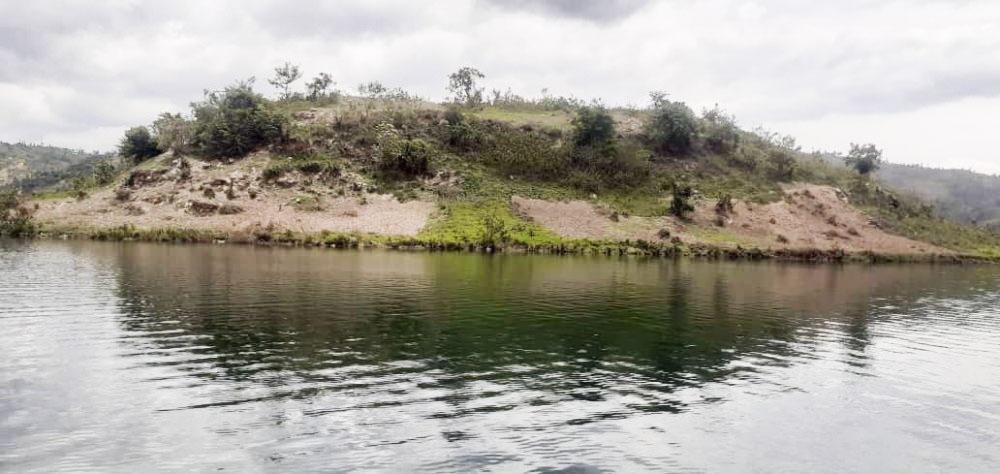Africa-Press – Rwanda. Two Lake Kivu islands, Shyute and Kamiko, that were once deforested and degraded will soon be restored with 156,000 different tree species, including native species, to help Rwanda tap into the carbon market, The New Times has learnt.
A carbon market is a trading system in which tonnes of reduced carbon emissions (climate-polluting gases) are sold. Reduced tonnes of emissions are called “carbon credits”. A carbon credit is equivalent to one tonne of reduced carbon emissions.
The restoration projects receive financial incentives based on the amount of carbon emissions the protected forests have reduced and sold on the carbon market each year.
Albert Sengambi, an official in charge of Agriculture and Livestock in Nyamasheke District, said restoring the two islands will save some biodiversity on Lake Kivu from disappearing.
“We have a partner to help restore the two islands. Once restored, the two islands will attract tourists,” he said.
Ange Imanishimwe, a biodiversity scientist who leads the Biodiversity Conservation Organization (BIOCOOR) that has been tasked to restore the two islands, told The New Times that restoration of degraded land and forests will be implemented on 200 hectares.
“Restoration of the two Lake Kivu islands has multiple benefits. The planted trees will sequester carbon dioxide as a way of climate change mitigation by reducing greenhouse gases. Carbon market projects and payment of ecosystem service schemes could also be designed after restoration,” he said.
The project to restore the two islands will create jobs, and provide internships to students in biodiversity, among others.
“Ecotourism activities will be developed there like nature walks and exploration of the fauna and flora on islands. There will be the improvement of ecosystem structure, function, and composition, therefore, the area will have a potential for research-based tourism.
“As the country is enhancing the sector of services, it is ideal to restore those islands and valorise those natural resources to benefit both people and biodiversity,” he noted, adding that 156,000 trees will be planted on the two islands.
“We have both native and fruit species but 85 per cent are native species including medicinal plants,” he said.
The planted trees, he added, will be monitored by using GPS to ensure survival.
Rwanda’s forest potential on carbon market
Concorde Nsengumuremyi, Director General of Rwanda Forestry Authority, told The New Times that native tree species have potential on the carbon market.
“Native trees can play a crucial role in carbon credit programmes. They are well-suited to local ecosystems and can sequester carbon effectively,” he said.
He said Rwanda’s forestry sector has significant potential in the carbon market due to its efforts in forest conservation, restoration, and sustainable management.
“Some potential in the carbon market include forest conservation and expansion. Rwanda has implemented various initiatives to conserve its existing forests and increase forest cover through afforestation and reforestation programmes. These efforts contribute to carbon sequestration, which can be quantified and traded as carbon credits in the market,” he noted.
Two Lake Kivu islands that were once deforested and degraded will soon be restored with 156,000 different tree species
Nsengumuremyi said Rwanda’s efforts to enhance forest cover and improve forest management practices contribute to global climate change mitigation efforts, making it attractive for carbon market participation.
Rwanda is implementing REDD+ (Reducing Emissions from Deforestation and Forest Degradation), a global initiative that incentivises developing countries to reduce emissions from deforestation and forest degradation.
“Through REDD+, Rwanda can generate carbon credits by reducing emissions from its forestry sector and receive payments for these credits in the carbon market.”
He said Rwanda entered different partnerships to get technical and financial assistance to develop carbon projects and access carbon markets.
“Participating in the carbon market enables Rwanda to generate revenue from its sustainable forestry practices while contributing to climate change mitigation and sustainable development,” he noted, adding that both state and farmers’ forests can be put on the carbon market.
“Farmers can implement sustainable forestry practices that enhance carbon sequestration and receive carbon credits for their efforts. This can provide additional income for farmers and incentivise sustainable land management practices.”
So far, Rwanda Forestry Authority has officially recorded CO2 Capital, a company interested in investing in a forest management project aimed at generating carbon credits.
The current status of Rwanda’s forest cover is 724,695 ha (30.4 per cent) of Rwanda’s total land area.
In 2011, Rwanda committed to restoring two million hectares of land by 2030 through the Bonn Challenge.
For More News And Analysis About Rwanda Follow Africa-Press






